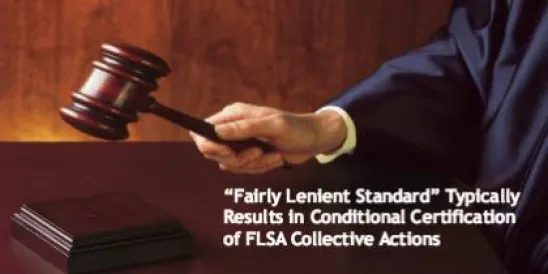On May 22, 2014, a California District Court conditionally certified a nationwide collective action covering about 1,500 female employees of Daiichi Sankyo Inc. (“DSI”) who allege the drug company paid them less than their male peers, ruling that the plaintiffs had met the low evidentiary burden to move forward collectively.
In SARA WELLENS, et al., v. DAIICHI SANKYO, INC., 2014 U.S. Dist. LEXIS 70628, the United States District Court for the Northern District of California granted the workers’ motion for conditional certification of their Equal Pay Act (“EPA”) claims, rejecting Parsippany, New Jersey-based Daiichi’s argument that the plaintiffs hadn’t identified a common unlawful policy that unifies their “highly individualized” pay claims.
According to the Daiichi Court, at the conditional certification stage, the question is not whether plaintiffs have proven their case that there is a widespread and discriminatory pay differential between men and women, but whether there is a reasonable basis to conclude that there are “potentially” similarly-situated class members who would “benefit” from notice.
DSI argued that the employees within the proposed collective class cannot be similarly situated because the job duties for the various positions included in the class vary widely. The court held that DSI misperceived the question relevant to this conditional certification stage: are plaintiffs similarly situated with respect to their EPA allegations? Here, the court decided, they are.
Simply, the Plaintiffs contended, as supported by their declarations, that they were subjected to a policy at DSI to pay women less in violation of the EPA. Thus, according to the court, they have made a preliminary showing that within their job titles, they are similarly situated. That DSI may pay different wages for different positions (within set ranges), that job duties vary between divisions and job titles, and that different positions are compensated differently based on location, are not factors that defeat conditional certification. Instead, whether the “disparate factual and employment settings of the individual plaintiffs” means that this case cannot proceed collectively, or would need to be prosecuted with subclasses for each of the job titles or geographic locations, is a matter to be determined at the second stage of the certification process.
The take-away from this case is that defeating conditional certification at stage one, the “notice stage,” is very difficult in light of the “fairly lenient standard.” Rather than attacking the merits of plaintiff’s allegations, employers who are preparing to oppose a motion for conditional certification of an FLSA collective action should focus on highlighting the lack of an illegal policy, plan, or decision and the lack of similarities between the plaintiffs but understand that it is an uphill battle in which employers infrequently prevail.





 />i
/>i
